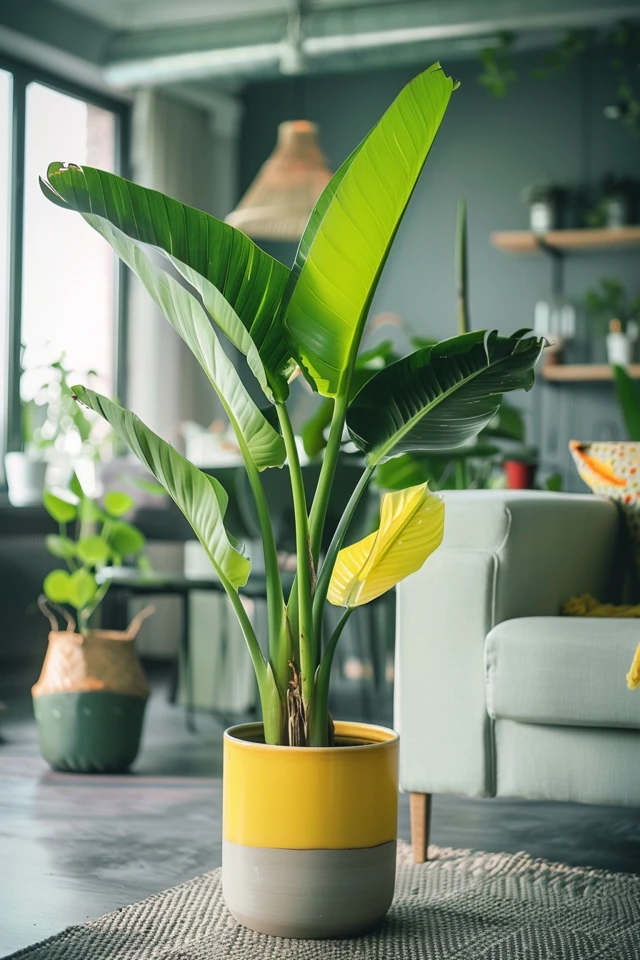Hello and welcome to my guide on reviving tropical plants, specifically the banana tree. If you’re dealing with a wilting or dying banana tree, don’t despair! With the right care and attention, you can restore its health and beauty. In this article, I’ll share some valuable banana tree care tips and steps you can take to bring your tree back to life.
Key Takeaways:
- Assess the condition of the banana tree and remove dead or rotting leaves and stems.
- Proper watering is crucial – avoid overwatering to prevent yellowing of leaves.
- Monitor the plant for signs of growth, such as new leaves.
- Be mindful of fungal growth and remove any mushrooms.
- Consistent care and attention can revive a banana tree in about a month and a half.

Banana Tree Care Tips for Healthy Growth
To care for a banana tree and promote healthy growth, it is essential to consider its light, water, and soil requirements.
Light: Most banana plants prefer bright, indirect sunlight, although they can tolerate some direct light or partial shade. To ensure optimal growth, make sure the plant receives the maximum possible sunlight.
Water: Proper watering is crucial for a banana tree. Provide enough moisture to keep the soil evenly moist but avoid overwatering, as it can lead to root rot. A good practice is to check the soil’s moisture level before watering.
Soil: Use a well-draining and organically amended soil with a slightly acidic pH for your banana tree. Good drainage is important to prevent waterlogging, which can harm the plant’s roots.
Fertilizing: Depending on the growing season, feeding the banana tree with a weak fertilizer every 1-2 weeks can help fuel its rapid leaf growth. Choose a fertilizer specifically formulated for tropical plants to provide the necessary nutrients.
Temperature: Maintain a suitable temperature range of 18°C – 25°C (65°F – 77°F) for the banana tree to thrive. Avoid exposure to extreme cold or hot temperatures, as it can stress the plant.
Humidity: Create a humid environment for the banana tree to mimic its natural habitat. Misting the leaves regularly and placing moisture-retentive pellets in the drip tray can help maintain humidity levels.
Tip: Following these care tips can help revive a wilted banana tree and promote healthy growth.

Tips for Repotting and Propagating Banana Trees
When it comes to saving a dying banana tree and reviving tropical plants, repotting and propagating are essential techniques. To ensure the growth of your banana tree, it is crucial to provide enough space for its development. Young plants, known as “pups,” tend to outgrow small pots quickly, so they may need to be repotted multiple times in their first year. Once the banana tree reaches 50 cm in height, repotting it once a year should be sufficient.
When repotting, it is important to use a well-draining potting compost that provides sufficient aeration for the plant. Adding materials like sand, perlite, or pumice can help achieve this. These amendments improve the soil structure, allowing excess water to drain away and preventing root rot.
The rescue and propagation of dying or wilted banana trees can be done through division. Baby banana trees, or pups, grow alongside the mother plant and develop their own root system. Once the pups have grown sufficiently, they can be carefully separated from the main plant and potted individually. This method not only saves the struggling plant but also creates an opportunity for new growth and a lush, vibrant garden of tropical plants.
By following these tips for repotting and propagating banana trees, you can help rescue and revive tropical plants, including the banana tree. Creating an environment that supports healthy growth and providing the necessary care will lead to a thriving indoor or outdoor garden filled with beautiful and resilient tropical plants.

Source Links
- https://www.nola.com/entertainment_life/home_garden/dont-cut-that-banana-tree-to-the-ground-trim-off-only-the-cold-damaged-leaves/article_77e2b122-9bed-11ec-9784-375e0edfc1a2.html
- https://carrottopsallotment.com/2021/04/25/bringing-a-banana-plant-back-to-life/
- https://leafy-life.com/how-to-care-for-musa-tropicana-banana-plant/

